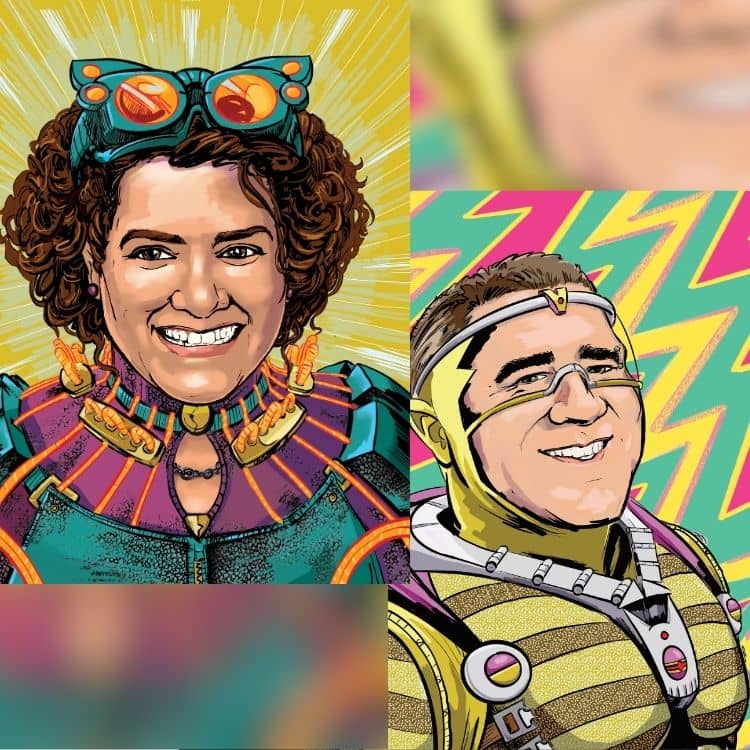The Marvel Cinematic Universe (MCU) features compelling characters and intertwined storylines. Think Captain America, Iron Man, X-Men, Thor, the Hulk, The Fantastic Four, Ant-Man, Wolverine, Black Panther, the Avengers and more.
In this episode of Policy 360, our two guests argue that in addition to being exciting stories to watch, the MCU features lots of messages about government, public policy, and society — and they’ve collaborated with more than two dozen leading scholars to explore these themes in an exciting new book.
Guests: Lilly Goren is professor of political science at Carroll University, and Nicholas Carnes is professor of public policy at Duke. Their book is The Politics of the Marvel Cinematic Universe (Kansas University Press, 2022).
Conversation Highlights
Responses have been edited for clarity.
Why focus on political content of an entertainment series?
Nick Carnes: In political science, we tend to focus on, “What are the messages being sent in explicitly political news or explicitly political TV shows?” There’s not as much quantitative research on the political content of entertainment fiction.
There have been some excellent recent articles by people like Eunjie Kim dissecting how watching a certain kind of TV show that’s not about politics can actually impact your views about real world political issues. And that’s very much the motivation for a lot of the work [in the book we edited].
On politics as power

Lilly Goren: As I always say in my political theory classes, we’re not talking about elections and voters. We’re talking about these concepts of: Where is power? How is power used? Who has power, who doesn’t have power? How are humans interacting with one another in interpersonal ways, as well as societal ways and cultures?
I read Marvel cinematic texts (movies and films) the same way I read Shakespeare or Plato or Machiavelli as texts. What are they teaching us. For example, there are so many different messages regarding women and power. You have superhero hero-ized women in the MCU who came late to the party. And in a lot of their origin stories, they don’t know what power they have.
I would argue that female characters that have been introduced in phases one through three and into phase four are not presented in the same way that the male superheroes are. They do come to their powers, but somebody else has to teach them things that they don’t know about their powers, whereas the male superheroes oftentimes have their foibles, I think, but there aren’t whole missing sections in their knowledge about their powers.
In my analysis of, Captain Marvel’s origin story or the She-Hulk origin story – they actually are sort of operating with one hand tied behind their backs with regard to their powers, because there are things that they don’t know that that they sort of learn along the way. Whereas Captain America learned those things as he was getting to know what his powers were.
On the MCU depiction of the US government

Nick Carnes: I worked with three research assistants and I had them record — in the first 23 films [of the MCU] — every single scene where there was a depiction of the U.S. government on the screen. (For example, I would include any government official or bureaucrat.)
Assuming the audience experiences the film from the protagonist’s point of view, they’re seeing government around them. What are they seeing? Something weak and incompetent? Something corrupt and evil? And is [what the viewer sees] promoting this kind of cynical view of government?
And what I found is that more often the depictions were positive. There were some instances where, you know, the government is trying to develop an unethical super soldier serum by chasing down poor Bruce Banner.
But more often, government is a sometimes misguided but capable adversary. So – government misunderstands the hero’s intentions and initially gets in their way but is [actually] quite capable. And other times, government is a capable ally to the protagonists.
You often see situations where government officials are working alongside superpowered individuals to save the day.
On making Asgard great again
Lilly Goren: The superhero story tends to be fundamentally nostalgic in that some big baddie has shown up on the scene and made things bad. And the superhero then gets called in to return [everything] to the status quo.
In Thor: Ragnarok, one of my favorite films in the genre, [the focus is on] making Asgard great again. And so [the film] is often sort of taking that tagline from President Trump, and applying it to each situation where you have somebody who’s come along and messed up your society.
I would think [this example is an overt political message] because it goes back to suggesting that the status quo was just fine, and that’s something we want to return to as opposed to moving forward or in a different direction.


